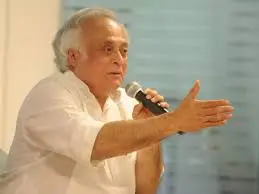‘Absolute lie’: Cong slams Rijiju’s govt ‘did not ask for names for delegations’ remark

A fresh political controversy has erupted between the Congress party and Union Minister Kiren Rijiju. The row centers on Rijiju’s recent statement that the Centre did not ask the opposition for names to join international delegations. These delegations were being formed to highlight terrorism, particularly the kind allegedly backed by Pakistan.
Congress quickly responded, calling Rijiju’s statement an “absolute lie.”
Congress Rejects Rijiju’s Claim
Congress General Secretary Jairam Ramesh said the Minister’s claim was misleading. He stated that on May 16, Rijiju personally contacted both Congress President Mallikarjun Kharge and Leader of Opposition Rahul Gandhi. According to Ramesh, the Minister asked for four names from the party to join the delegations.
In response, Rahul Gandhi sent a list. It included Anand Sharma, Gaurav Gogoi, Syed Naseer Hussain, and Amrinder Singh Raja Warring.
However, the government selected only Anand Sharma. It ignored the rest of the list. Instead, it added Shashi Tharoor, Manish Tewari, Salman Khurshid, and Amar Singh—none of whom were nominated by Congress for this task.
“Cheap Politics,” Says Congress
Ramesh called this a case of “cheap politics.” He said the government asked for names and then disregarded them. “This shows a lack of sincerity and transparency,” he added.
Congress accused the Centre of manipulating the process to appear inclusive while controlling the final outcome.
Congress MP Sandeep Dikshit echoed this sentiment. He claimed the BJP wanted to dominate the narrative and silence the opposition, even on critical national issues.
Assam CM’s Comments Add Fuel
Assam Chief Minister Himanta Biswa Sarma joined the controversy. He objected to Gaurav Gogoi’s name, suggesting links to Pakistan. Congress leaders dismissed the allegation as baseless and defamatory.
They said it was part of a larger effort to discredit the opposition ahead of the 2024 elections.
A senior Congress leader said, “Instead of standing united against terrorism, the BJP is targeting opposition voices.” The party believes this weakens India’s credibility on the world stage.
Missed Opportunity for Unity
Initially, the idea of bipartisan delegations was welcomed by many. It suggested a chance to present a united front on terrorism. But the final list and the government’s actions have sparked doubt.
Political analyst Prashant Tiwari commented on the issue. “If the government was serious about unity, it would have respected Congress’s nominations,” he said.
He added that excluding those names made the process look selective and political, not diplomatic.
Congress Demands Transparency
Congress has now asked the government to release official communication on the matter. Jairam Ramesh urged the Centre to show proof of what was discussed and agreed.
“Let the people see the truth. We have nothing to hide,” he said during a press interaction.
The BJP, so far, has not offered further clarification. Rijiju has remained silent since the issue escalated.
Conclusion
This episode has raised concerns about how seriously the government takes bipartisan collaboration. The issue of terrorism is important and demands unity. However, this controversy shows that political calculations still dominate decisions, even in matters of national interest.
The government’s reluctance to include opposition-nominated names may hurt its image globally. It also highlights how internal politics continues to affect India’s external messaging. What could have been a powerful, united diplomatic move has now become yet another battleground in India’s political rivalry.






